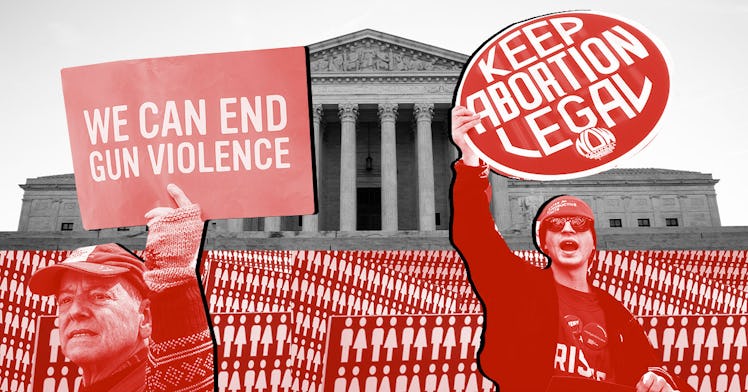It’s Open Season: 3 Upcoming Cases Could Change Parents’ Lives
Healthcare, public safety, and education funding are all at risk.

Fresh off of its shadow docket decision allowing Texas’s draconian abortion law to stand, the Supreme Court begins its formal term today. With the exception of Brett Kavanaugh, who recently tested positive for COVID-19, the justices will meet in person for the first time since the start of the pandemic.
The docket for the first three months of the term has been set, and there are three big cases that center on issues that directly impact American families. The right-wing slant of the Court and its demonstrated willingness in the Texas case to act with ideological ends means that the rights of women to access healthcare, families to live in safe communities, and taxpayers to not pay for proselytizing are all in danger.
Abortion
On December 1, the Justices will hear arguments in Dobbs v. Jackson Women’s Health Organization, which centers on a Mississippi law that bans abortion at 15 weeks excepting “medical emergencies or for severe fetal abnormality” with no exceptions for rape or incest.
Upholding the law would mean overturning Roe v. Wade and Planned Parenthood v. Casey. That’s why two separate federal courts have blocked it from going into effect since it was passed in 2018.
But the current Federalist Society-approved majority on the Court seemed open to interfering in the healthcare decisions of pregnant people, a bent that seemed clearer to pro-choice advocates when the Court pushed unsigned ruling upholding the Texas law. If they decide that further delegitimizing the Court is worth ending Roe, millions of people—nearly 60 percent of whom are mothers—will likely be denied access to abortion care.
Guns
On November 3, the Court will hear oral arguments in New York State Rifle & Pistol Association v. Bruen. The case centers around a New York state law that requires residents to obtain a license to carry a concealed firearm and demonstrate that “proper cause”—a great need for the license or a “special or unique danger to their life”—exists.
The state says that its law is part of a long tradition of reasonable gun regulation going back to the phrase “well-regulated” in the Second Amendment. The challengers say that their rights under that amendment “obviously extends outside the home” and that preventing them from carrying concealed weapons in public is a violation of those rights.
Given the proven positive correlation between gun prevalence and violent crime, laws that limit the former in public settings would seem likely to depress the latter, which is essentially the argument the state is making to uphold the law.
Funding for Religious Education
On December 8, the Court will hear arguments in Carson v. Makin, which centers on whether the state of Maine can prevent parents living in rural areas without school districts from using state-issued vouchers to pay tuition at schools that teach academic subjects religiously. Notably, religious organizations that provide nonsectarian education are free to receive such vouchers.
Maine’s argument is that it is simply “declining to fund explicitly religious activity that is inconsistent with a free public education” by preventing taxpayer money from going to sectarian schools like the one in this case, which has a mission of “instilling a Biblical worldview” and refuses to hire teachers who are members of the LGBTQ community.